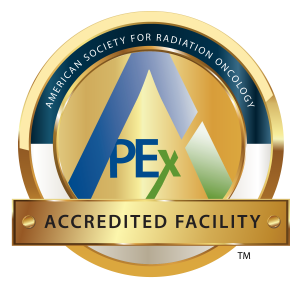Radiation therapy
Your oncologist may recommend radiation therapy as part of your cancer treatment plan. At Community Hospital of the Monterey Peninsula, you’ll benefit from superior care and a wide range of treatment options thanks to our strong focus on this form of therapy.
 Accreditation means excellent care
Accreditation means excellent care
Community Hospital is the only Monterey facility that meets standards set by the American Society for Radiation Oncology’s Accreditation Program for Excellence (APEx). We chose to earn this accreditation because your safety and well-being are our priorities. This recognition means you benefit from the best:
- Radiation technology
- Support and care coordination services
- Treatment procedures
To improve your care experience and outcome, choose an APEx-accredited facility for radiation therapy.
Advanced technology for the best radiation therapy
Feel confident you’re receiving treatment at one of the best places for radiation therapy in the country thanks to our focus on mastering advanced technology. Your care may involve:
- Monaco™ treatment planning system — This is a computer system that determines the exact right dose of radiation that will effectively and safely treat cancer
- Linear accelerator — This is a medical device that customizes the amount of energy needed during treatment to destroy tumors in any part of the body without affecting healthy tissue
Your treatment plan
You’ll receive a personalized plan developed by a multidisciplinary group of specialists and reviewed weekly. You may have one or more types of radiation therapy, as well as other cancer treatments.
You may receive imaging scans daily or weekly to make sure your treatment targets the best place on the body to treat the cancer successfully. Your radiation oncologist will review the scans.
Our radiation oncology experts
Your cancer care team will include:
- American Board of Radiology (ABR) — certified radiation oncologist – Evaluates your condition and recommends a specific treatment or combination of treatments, as well as how often and long you need treatment
- ABR-certified medical physicist — Reviews your treatment plan and makes sure you receive the right amount of radiation to the right area of the body following safety guidelines
- Dosimetrist — Determines the amount, or dose, of radiation you’ll receive, so it’s as safe and effective as possible
- Radiation therapist — Performs your treatments
- Radiation oncology nurses — Meet with you to teach you about self-care and treat any side effects
Our skilled staff takes part in continuing education and in-depth training to learn the latest best practices and technology in their field.

Hope and healing
When a patient completes their treatment journey, we ring a bell to celebrate your courage and strength. Ringing it marks a new chapter of hope and healing.
We focus on your experience
Find healing through unsurpassed medical care with a human touch. Count on your radiation oncology team to make your cancer journey as comfortable as possible for you and your family. Expect us to:
- Always treat you and your loved ones with kindness and compassion
- Listen, answer questions, and provide emotional support
- Educate you about what to expect and the safety procedures we follow
- Provide warm blankets and terry cloth white robes during treatment sessions
- Play your favorite kind of music during treatment if you'd like
See what our patients are saying
For years, your neighbors have consistently given us the highest possible scores on surveys of their radiation therapy experience. That’s because we not only care about your clinical outcome, but also about you as a whole person. See what our patients are saying:
Your compassion alleviated my fears.
— Community Hospital radiation therapy patient
Everyone is so kind and also genuinely takes the time to make sure everything is understood.
— Community Hospital radiation therapy patient
You made us feel like family.
— Community Hospital radiation therapy patient
Everyone was so helpful and so supportive with all our questions.
— Community Hospital radiation therapy patient
I love all the therapists and nurses. Everything made me feel comfortable and safe.
— Community Hospital radiation therapy patient
Common questions about radiation therapy
What’s radiation therapy?
Radiation therapy kills cancer cells using high-energy radiation that may come from:
- An intense beam of energy, such as X-rays and protons
- Radioactive materials placed in the body in or near tumors
This treatment lets your radiation oncologist find and carefully treat cancer with precision and accuracy, minimizing side effects and harm to healthy tissue.
Watch a video on what to expect from the American Society for Radiation Oncology (ASTRO). Visit ASTRO's patient video page more information on radiation therapy for specific diagnoses.
Types of radiation therapy
Explore different treatments — some unique in Monterey County to Montage Health — that use radiation to destroy or shrink cancer:
- External beam therapy (EBT) — Treats tumors using a device called a linear accelerator that delivers high-energy X-rays or electrons
- Image-guided radiation therapy (IGRT) — Lets your radiation oncologist pinpoint the exact location of a tumor before each treatment.
- Optical Surface Monitoring System (OSMS) — enables real-time surface tracking to maintain accurate patient positioning and motion management throughout each radiation therapy treatment. A significant advantage of OSMS is its ability to reduce the need for invasive markers, or tattoos, which are traditionally used for patient alignment. While most radiation therapy centers typically require 3–4 tattoos, most patients at Community Hospital's radiation therapy center only receive one, or no tattoo at all.
- Intensity-modulated radiation therapy (IMRT) — Gives tumors a customized dose of radiation
- Volumetric Modulated Arc Therapy (VMAT) — Delivers precise radiation doses through continuous arc movements
- Low-energy X-ray therapy, or superficial therapy — Treats skin cancer
- Stereotactic radiosurgery — Uses tightly focused, high-dose beams to treat brain tumors
- Stereotactic body radiotherapy — Limits healthy tissue’s exposure to radiation and accounts for tumors that move as you breathe
Is radiation therapy safe?
Count on our staff to explain the risks and benefits of radiation therapy. Rest assured, your expertly trained team will follow the highest standards to make sure your treatment is safe and effective.
What are the safety measures and quality controls?
Our specialists perform many safety checks during your radiation sessions. Every day we treat patients, we check our machines to make sure they’re working correctly. Our medical physicist does all the monthly and annual quality tests required by the state of California and recommended by the American College of Radiology.
When you have treatment, you’ll log in with an electronic ID badge and confirm your identity and treatment plan. Benefit from our use of a computerized system that stores your plan in a database and makes sure it matches your treatment before it happens — so you have peace of mind that your radiation therapy is correct, every time.
A doctor is always available in our department during treatment.
What are possible side effects?
During radiation treatment, rely on your care team to limit any side effects and communicate with you regularly, so we can address your concerns or symptoms as quickly as possible.
Common side effects of radiation therapy include:
- Redness, irritation, hair loss, or skin darkening of the area getting treatment
- Tiredness
You may also have other side effects, depending on the area of the body that receives radiation. If your treatment affects the:
- Abdominal or pelvic area, you may have diarrhea, loss of appetite, nausea, urinary or digestive tract irritation, or sexual symptoms
- Chest, you may experience cough, shortness of breath, or sore throat
- Head or neck, you may have decreased thyroid gland function, dry mouth, sore throat or mouth, or thickened saliva
Some people do not experience any side effects from radiation therapy. If you do experience side effects, they’ll usually go away soon after you complete treatment.
When should I call my doctor?
If you have side effects, contact your radiation oncologist for prompt diagnosis and treatment.
What happens after I finish radiation therapy?
Celebrate the end of your treatment by ringing a bell heard throughout Community Hospital of the Monterey Peninsula’s radiation oncology department.
You’ll see your radiation oncologist for checkups for several months after you complete therapy.
Questions after treatment
If you have questions about radiation treatments you had in the past at Community Hospital or another organization, reach out to our team at (831) 625-4630.